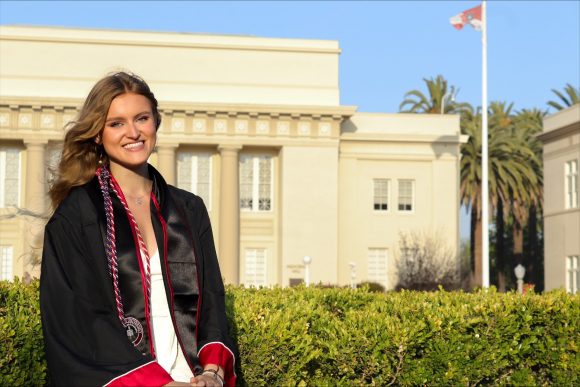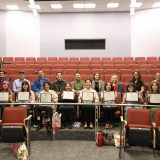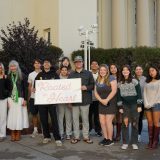
Tyler Drake and Her Internship Experience at the Roberts Family Development Center Career Corner
August 17, 2023

Erin Berthon, MA Career Manager, Wilkinson College of Arts, Humanities, and Social Sciences, at Chapman University
In spring 2023, Wilkinson College invited alum Derrell Roberts (’81) back to Chapman to talk to students about internship possibilities at his Sacramento-based foundation, the Roberts Family Development Center (RFDC), which hosts a Children’s Defense Fund Freedom School each summer. RFDC provides a holistic approach focusing on PreK-12th grade academic support and enrichment, including community involvement and advocacy. The foundation hired three Wilkinson students as interns for the summer. I sat down with one of those lucky students, Tyler Drake (History, ‘23) to talk about the foundation and her experience.
Erin Berthon: Before we get into your experience, can you tell me about the foundation?
Tyler Drake: The RFDC customizes culturally responsive services and programming, including year-round academic and enrichment supports, youth violence prevention and intervention, and numerous family and community empowerment initiatives. The model supports children and families around five essential components: high-quality academic enrichment, parent/family involvement, social action/civic engagement, intergenerational leadership development, and physical/mental health.
EB: What was the preparation for the internship like?
TD: While researching internships, I knew I wanted something related to education. I was interested in pursuing teaching after college, but I wanted an intro—level position that gave me a solid foundation for future teaching positions. When I saw that Derrell Roberts, the co-founder of RFDC, was coming to recruit interns at Chapman, I wanted to hear what he had to say about the program. After attending his presentation and hearing him talk about the history and mission of the organization, I became more interested. When Mr. Roberts ended his presentation with, “if you want to serve a community and help make a difference in a child’s life, then this internship is for you,” I was hooked.
Training for the Student Leader Intern (SLI) position began around late March. Once I went through the application and interview process, I was pleasantly surprised to find that the organization was very accommodating to those of us who were not able to attend the training in person. As the organization is based in Sacramento and I was still at Chapman, RFDC made it easy for us non-locals to join the training digitally. For the first two months, every other weekend, the organization walked us through the history of the organization to help us understand the mission behind Freedom Schools. These training sessions were very informative and helped us get a better understanding of the program and its goal to help children gain easier access to the benefits of reading and literature. The training also thoroughly discussed classroom management, the Children’s Defense Fund Freedom School’s reading and literacy curriculum, and the overall expectations for us as SLI. As someone who had never done anything like this before, it all seemed intimidating at first but looking back, I am very grateful that they trained us as thoroughly as they did because it prepared us well for the classroom.
Plus, the training and preparation also involved a week-long trip to Tennessee! This was an amazing opportunity for team bonding, meeting other SLIs from other programs across the country, and practicing what we learned in training with other trainees. I loved the Tennessee training, and it helped solidify the mission of Freedom Schools and my friendships with my fellow interns.
EB: What was the most rewarding and challenging part of the internship?
TD: The unknown was challenging. Once we all returned to Sacramento and our lesson plans, activities, and classrooms were prepared, it was time to welcome our students around late June. Despite the detailed training we had received, I don’t think I was quite prepared for the challenges that lay ahead of me over the following six weeks. It doesn’t seem like it, but being in a classroom filled with five 7-year-olds is intimidating at first. Especially when they all have their own unique personalities, backgrounds, and quirks, it took some getting used to, but after a while, I began to find my rhythm and figure out what strategies worked and didn’t work when it came to either in-class lessons or everyday playground drama. There were some days when my patience was tested, and I would come home feeling defeated; however, I learned that is completely normal, and I had all my fellow coworkers going through the exact same thing to help validate what I was going through, I would say the most challenging was maneuvering around behavioral issues and practicing discipline with many of the younger students. On the flip side, it was incredibly rewarding when I would have a breakthrough moment with a student, and I could see their attitude shift and watch them get excited and proud of something they made or worked on. It was an amazing feeling and would always outweigh the challenging moments.
EB: What part of the internship did you take away for your next career steps?
TD: After this internship, I am more interested in continuing my teaching journey. I want to experience teaching older levels to see if I find it more fitting because it does take a lot of patience when working with younger scholars, but I would not mind continuing the elementary teaching route. This position also allowed me to practice and learn more social skills as it does require you to engage with both children and adults like fellow teachers and parents. There were times when I had to problem-solve, have serious conversations with parents, and figure out how to handle those conversations as delicately and respectfully as possible. That skill I will take with me no matter where I go. Likewise, this internship allowed me to practice being in a leadership role and set an example for my students and their families on how to be a leader in our communities. That is something I will also take with me as I continue my career steps.
EB: What is something you will always remember from the experience?
TD: Something I will always remember from this experience is the relationships I made with both my fellow SLI and my students. This was the nicest and most supportive group of people I have ever worked with. Everyone at RFDC wants to help and see you succeed, so you always feel welcomed and supported. Moreover, the relationships I built with my students I will remember forever. They each had their own unique personalities and something amazing to bring to the table, and I will always cherish the time I got to work with them and see them grow as scholars in the short period I had with them. Even if I did not feel like I made a major impact on them academically, some of them developed so much confidence, made new friends, or found a new skill by the end of the summer. That alone was very fulfilling.
EB: What would you say to next year’s students interested in this internship?
TD: For those who are interested in this internship, there are really no downsides, and it is very rewarding. Even if you are not interested in teaching in the long run, it is a great learning and real-world experience, and you get to work and meet so many amazing people. Now that I have finished the internship, I am very glad and proud that I chose to do it, and I would love to do it again for future summer programs.

